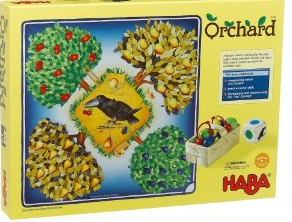 Written by monthly contributing writer, Natalie Didlake.
Written by monthly contributing writer, Natalie Didlake.
Ready to pull out the board games for the cold weather, but tired of Monopoly and Clue? Playing games as a family is a great bonding experience and builds memories for years to come. A collection of games is also very useful for hospitality events in your home. It is an easy way to break the ice, build relationships, while enjoying good laughter together!
There are lots of great board games out there you may not have seen before. Many are European made, just gaining popularity.
We’ve been collecting these games for a few years, so I’ve assembled a list of our favorites. They are all wholesome, engaging, and lots of fun!
(Note: You’ll pay a little more for these games, but I promise you will not get tired of them! We have played these over and over, and they still haven’t gotten old!)
KIDS GAMES
Orchard – This is our favorite kids’ game! Roll a wooden die to collect fruit before the bird eats it! Well-made, sturdy pieces. Great for colors and matching. Our 2-year-old even plays. Best of all, it’s a team game! Players work together instead of competing against each other.
Hisss – Players build colorful snakes by matching colored cards. It’s so fun to wait and see who will draw the last card of a snake! Very simple and easy to play, also short. We can usually play at least 2x in one sitting.
Uno Moo – Great for preschool age and older. Variation on Uno, obviously. Get rid of your farm character pieces by matching either color or animal. Great for learning basic strategy. Very colorful and cute!
Bingo Link – Get a “bingo” by connecting hexagonal spaces across the board. Each hexagon contains a tiny photographed object. If you like the “I Spy” children’s books, you’ll love this game, because it’s made by the same people! Also easy enough for the youngest children to play. Sturdy boards and pieces.
ADULT GAMES
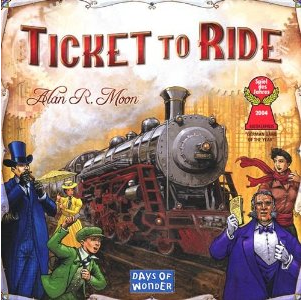 Ticket to Ride – Start with this game if you’d like to try one but aren’t sure where to begin! Simple to play, but challenging. Build train routes across the U.S. from city to city, before someone else does. Would be great for geography fun, probably 8 and up.
Ticket to Ride – Start with this game if you’d like to try one but aren’t sure where to begin! Simple to play, but challenging. Build train routes across the U.S. from city to city, before someone else does. Would be great for geography fun, probably 8 and up.
Dominion – My all-time favorite! A game using cards, in a medieval setting. Build your deck in order to gain the most points. Cards can be changed each game, making each time you play unique and very exciting!
Some may not want to purchase, as this game has a witch card and a curse card that deducts points for the person who receives one. Alternately, the game could be played without these cards.
Settlers of Catan – This game is becoming more popular, so you may be familiar with it! Takes one or two games played through to catch on, but very fun once you master it. Players barter for sheep, wheat, bricks, and other commodities in order to build the most roads and cities. 3-5 players required.
Big Boggle – My first love (at least in games) is for word games, so I have to list at least one! Boggle is great, but this version has a 5 x 5 grid instead of 4 x 4, so you can make more and longer words. My hubby and I keep in our room and play a round (or 5) before bed sometimes. Don’t forget the dictionary!
Agricola – We think this one is the ultimate board game! Has about a million tiny, wooden pieces, takes 2-3 hours to play, very involved, but soooo fun. Especially for those who love strategy games. Another medieval game, build your farm, buy animals, add children, and feed your family. Can be played with 2, but best with a small group.
Do you have any favorite games to add? We are always looking for a new one!
 For the toddler/preschool age, we have used and love the
For the toddler/preschool age, we have used and love the  For the elementary ages, some recommendations include:
For the elementary ages, some recommendations include: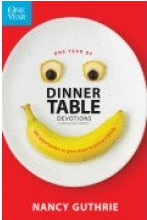 A recent new release by Nancy Guthrie, called
A recent new release by Nancy Guthrie, called 



 Amanda Bacon enjoys life with her family in the beautiful state of Alaska. She is married to Jeremy, and has six children ages 10, 9, 6, 3, 14 months, and 10 months. Her interests include helping women grow in relationship with the Lord, adoption, homeschooling, sewing, knitting/crochet, and blogging at
Amanda Bacon enjoys life with her family in the beautiful state of Alaska. She is married to Jeremy, and has six children ages 10, 9, 6, 3, 14 months, and 10 months. Her interests include helping women grow in relationship with the Lord, adoption, homeschooling, sewing, knitting/crochet, and blogging at 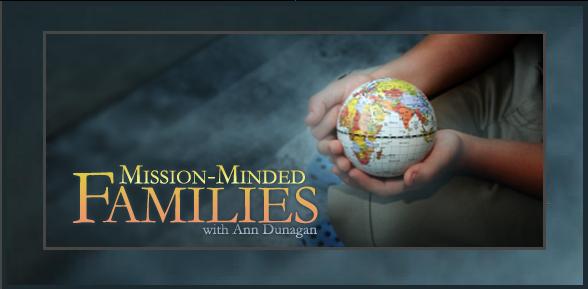


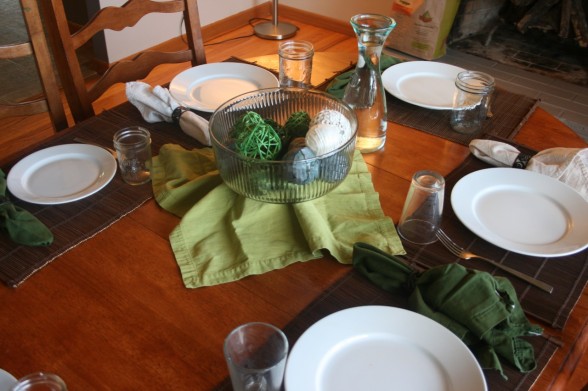 “There is no life experience that replaces the connection and significant created by eating together at the table. Whether young or old, when a person experiences trauma, temptation, or embarrassment, being invited to the table makes them feel valued and restores their sense of significance.” – Devi Titus,
“There is no life experience that replaces the connection and significant created by eating together at the table. Whether young or old, when a person experiences trauma, temptation, or embarrassment, being invited to the table makes them feel valued and restores their sense of significance.” – Devi Titus,